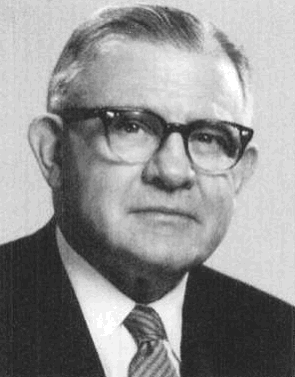Henry D. Moyle
Henry Dinwoodey Moyle was born April 22, 1889 at Salt Lake City to James H. Moyle and Alice E. Dinwoodey Moyle.
Raised in The Church of Jesus Christ of Latter-day Saints and baptized as a child, Elder Moyle married Clara Alberta Wright on October 16, 1919, at Salt Lake City, Utah. The union was blessed with the birth of six children.
He received a bachelor's degree in mining engineering from the University of Utah in 1909 and studied geology for a year at the Freiberg, Germany mining school. He received another degree in science from the University of Utah and then obtained a law degree from the University of Chicago. He also further trained in law at Harvard Law School. For many years, Moyle worked as a lawyer and a part-time member of the University of Utah faculty. He was also a businessman involved in various railroad, trucking, oil, insurance, and finance businesses. During World War II, he was the director of the Petroleum Industries Council. He was a successful cattleman and he originated the idea of the Church establishing a cattle ranch in Florida.[1] The Church originally bought 54,000 acres in 1950, and the ranch grew to over 312,000 acres. The ranch was known as Deseret Cattle and Citrus Ranch and now Deseret Ranches.[2]
Elder Moyle was called to preside over the Cottonwood Stake by 1927. He served until 1937. He was ordained an Apostle on April 10, 1947, by President George Albert Smith and assumed his place in the Quorum of the Twelve Apostles. After announcing the call, President Smith said, "The brethren whose names we added to the list of the General Authorities by your vote today have not had an opportunity, perhaps, to get their breath, but we would be glad to have them tell us whether they are willing to serve, or not, and they may say anything else they have in their hearts. We shall ask Brother Henry D. Moyle to come to the stand."
Elder Moyle's comments follow: "It goes without saying that we do in this Church what we are told. I have never understood that it was my privilege as a member of this Church, holding the priesthood, to say no. I have never had a desire in my heart to do anything other than that which the brethren direct. While I may feel as if some of the things that they have most recently asked me to do are beyond my power, nevertheless so far as my Heavenly Father will give me the power to act I shall do so, and all that I have and am belongs to my Heavenly Father. I had a grandfather who met with a very great disaster. All that he had was swept away by fire. His thoughts and his actions at the moment he was told of his loss have been on my mind for the past several minutes, and I must say I feel rather as he then felt:
- the Lord gave, and the Lord hath taken away; blessed be the name of the Lord. (Job 1:21.)
I know that the Lord can take that away which he giveth, if we give him cause so to do; that we may be the recipients of his blessings today but to continue to be such recipients, we must be obedient to his laws and his commandments."
Elder Moyle served the Quorum honorably until June 12, 1959, when President David O. McKay called him to be his second counselor. He was sustained as first counselor to President McKay on October 12, 1961, a position in which he served until his death.
In an address to the missionaries of the California Mission, he stated: "I shall go to my grave saying that missionaries ... never rise in their entire life above the stature they carve out for themselves in the mission field. I ask the missionaries all over the world to write that in their book, and then read the book ten years from now. If perchance, they have not risen in that first ten years after they come home from the mission field, above that status of mediocrity that they [may have] maintained in the mission field, [they should] get down on their knees, pray, and work a little harder and seek to overcome that tremendous handicap they placed upon themselves by their lack of application, lack of appreciation, and lack of dedication in the mission field. (Address to California Mission June 2, 1962.)
President Moyle died on September 18, 1963, at Deer Park, Florida.
